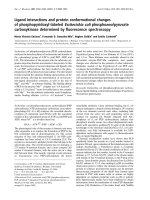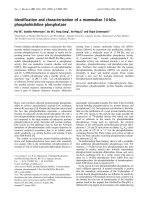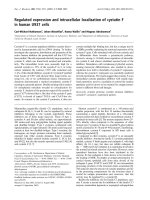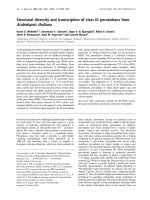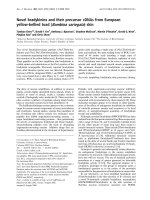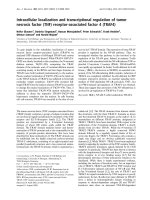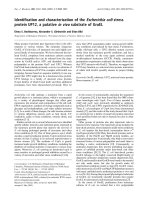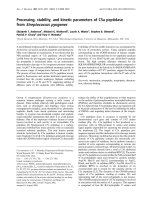Báo cáo y học: " Relatives Education And Coping Toolkit - REACT. Study protocol of a randomised controlled trial to assess the feasibility and effectiveness of a supported self management package for relatives of people with recent onset psychosis" pdf
Bạn đang xem bản rút gọn của tài liệu. Xem và tải ngay bản đầy đủ của tài liệu tại đây (273.13 KB, 7 trang )
STUD Y PROT O C O L Open Access
Relatives Education And Coping Toolkit - REACT.
Study protocol of a randomised controlled trial to
assess the feasibility and effectiveness of a
supported self management package for relatives
of people with recent onset psychosis
Fiona Lobban
1*
, David Glentworth
2
, Laura Wainwright
1
, Vanessa Pinfold
3
, Lesley Chapman
1
, Warren Larkin
4
,
Graham Dunn
5
, Adam Postlethwaite
1
and Gillian Haddock
6
Abstract
Background: Mental health problems commonly begin in adolescence when the majority of people are living
with family. This can be a frightening time for relatives who often have little knowledge of what is happening or
how to manage it. The UK National Health Service has a commitment to support relatives in order to reduce their
distress, but research studies have shown that this can lead to a better outcome for service users as well.
Unfortunately, many relatives do not get the kind of support they need. We aim to evaluate the feasibility,
acceptability and effectiveness of providing and supporting a Relatives’ Education and Coping Toolkit (REACT) for
relatives of people with recent onset psychosis.
Methods: The study is a randomised control trial. Trial Registration for Current Controlled Trials ISRCTN69299093.
Relatives of people receiving treatment from the Early Intervention Service for psychosis are randomly allocated to
receive either Treatment As Usual (TAU) or TAU plus the REACT intervention. The main aims of the study are to:
(i) deter mine the acceptability of a supported self-management intervention; (ii) determine preference for type of
support; (iii) assess the feasibility of the design; (iv) identify the barriers and solutions to offering support for self-
management approaches within the NHS; (v) estimate the likely effect size of the impact of the intervention on
outcome for relatives; (vi) gain detailed feedback about the barriers and solutions to using a self-management
approach; (vii) describe the way in which the intervention is used. Outcomes will be assessed from baseline and at
6 month follow-up.
Discussion: The intervention is compared to current treatment in a sample of participants highly representative of
relatives in routine early intervention services across the UK. The intervention is protocolised, offered within routine
practice by existing staff and extensive process data is being collected. Randomisation is independent; all
assessments are made by blind raters. The limitations of the study are the lack of control over how the
intervention is delivered, the short follow-up period, and the lack of assessment of service user outcomes. Despite
these, the findings will inform future effectiveness trials and contribute to the growing evidence base for
supported self-mangement interventions in mental health.
* Correspondence:
1
Spectrum Centre for Mental Health Research, School of Health and
Medicine, Lancaster University, Lancaster, LA1 4YT, UK
Full list of author information is available at the end of the article
Lobban et al. BMC Psychiatry 2011, 11:100
/>© 2011 Lobban et al; licensee BioMed Central Ltd. This is an Open Access article d istributed und er the terms of the Creative Commons
Attribution License ( which permits unrestricted use, distribution, and reproduction in
any med ium, provided the original work is properly cited.
Background
Psychosis affects approximately 1% of people and is the
third most disabling condition worldwide [1]. First epi-
sode commonly occurs in adolescence at which time it
is estimated that 60-70% will be living with their family
[2]. The government recognises the very important role
of relatives and is committed to providing them with
appropriate support via NHS services [3]. Family inter-
ventions (FIs) are effective in improving outcome for
people with psychosis and their relatives. As an adjunct
to pharm acotherapy, FIs reduce relapse and hospitalisa-
tion rates [4,5]. FIs generally focus on cognitive and
behavioural techniques to modify appraisals that rela-
tives hold about the behaviour of the person with psy-
chosis and develop coping strategies. Research is limited
in its focus on people with more chronic mental health
difficulties, and lack of attention to outcomes for rela-
tives. However, interventions that are well integrated
into Early Intervention Services (EIS) show reductions
in relatives’ distress [6], and appraisals held by relatives
at first episode of psychosis are significant predictors of
important determinants of outcome [7].
Significant barriers still exist to the dissemination of
effective interventions through NHS EIS. These include
clinicians with high caseloads and lack of confidence
and training in working with relatives [8]. As a result,
relatives report significant negative impact on many
are as of their life, and the risk of distress is even higher
at first episode than at later stages [9].
There is a clear need for an intervention that can be
widely available to relatives, is easy to use, phase specific,
recovery focussed, does not require extensive cli nical
resources, targets key appraisals and coping strategies
and empowers relatives. Self-management interventions
that have the flexibility to be used alongside other work
and family commitments and augment other forms of
support are ideally suited to meet the needs of relatives.
Self-management refers to health technologies (writte n/
audio/video/computer/internet) to assist users to manage
a parti cular health problem, with l ittle or no professional
input. They can be used as stand-alone interventions or
as an adjunct to other forms of intervention. This is a
rapidly growing area and a recent meta-analysis of stu-
dies evaluating such approaches for depression shows
promising results [10]. Great er effectiveness is associated
with using a ‘guide d’ model with low-level contact with a
professional/paraprofessional, and a CBT (Cognitive
Behaviour Therapy) rather than educational model [10].
Self-man agement approaches can increase dissemination
of evidence ba sed interventions to large numbers of peo-
ple, and foster empowerment. Although much self-help
literature has been written for a wide range of mental
health problems, there is little development in the area of
psychosis and few high quality evaluations from which
conclusions can be drawn regarding effectiven ess [11].
We are not aware of any studies which have systemati-
cally evaluated the use of a supported self-management
approach for relatives of people with psychosis.
This paper describes the rationale and protocol for a
randomised controlled trial in which relatives of people
at first episode psychosis in EIS receive current treatment
or current treatment plus the REACT supported self-
management toolkit . The main aims of the study a re (i)
to determine the acceptability of a supported self-
management intervention and outcome measures to rela-
tives of people with recent onset psychosis; (ii) to deter-
mine preference for type of support (email/telephone);
(iii) to assess the feasibility of the design as measured by
rates o f recruitment, retention, attendance a nd direct
feedback from participants; (iv) to identify the barriers
and solutions to offering support for self-management
approaches for relatives of people with psychosis in the
NHS; (v) to estimate the likely effect size of the impact of
the intervention on outcome for relatives; (vi) to gain
detailed feedback from relatives about the barriers and
solutions to using a self-management approach; (vii) to
describe the way in which the intervention is used. This
is not intended as a ‘ defin itive’ randomised controlled
trial and will not assess the impact on patient outcomes
or cost effectiveness. Further funding will be sought to
address these issues if this study supports the feasibility.
Methods
This trial is conducted by a multidisciplinary team of
researchers, clinicians, s tatistician and relatives based
across academic institutions and NHS Trusts in the
North West of England. The research team are respon-
sible for the content of the intervention and have
worked with a design company to produce the toolkit
and website. The trial is supported by an independent
Trial Steering Committee.
Design
Randomisation, Treatment Allocation and Blinding
This is a stratified randomised controlled trial in which
participants are allocated t o receive either Treatment As
Usual (TAU) or TAU plus the REACT intervention. Ran-
domisation is done using permuted blocks within Trust
with block sizes varying randomly, and is carried out by
an independent Clinical Trials Unit at The Christie NHS
Foundation Trust, Manchester. Assessments are carried
out in face-to-face interviews at baseline and at 6 months
follow-up. Participants ar e referred into t he study by
Care Coordinators or self-referral. Potential participants
are contacted by a research assistant (RA1) who presents
them with verbal and written information about the
Lobban et al. BMC Psychiatry 2011, 11:100
/>Page 2 of 7
study. If they wish to take part, the participant is asked to
give written consent. Following this, a baseline interview
is conducted to assess eligibility and to complete all the
measures. A second research assistant (RA2) then con-
tacts the Clinical Trials Unit and provides information
about which Trust the relative is in. They are given the
trial allocation by telephone. RA2 contacts th e relative by
telephone and post to inform them which arm of the trial
they have been allocated to. RA2 c ontacts the relevant
support worker who will guide the relative through the
intervention and instructs them to arrange the first
appointment with the participant. RA2 also arranges the
6 month follow-up interview date. In order to ensure that
outcomes are collected blind to the treatment allocation,
a letter is sent prior to this interview reminding the parti-
cipant about the importance of not letting RA1 know
which group they were allocated to, and making sure that
the REACT toolkit is not visible in the hous e. This is fol-
lowed-up with a phone call the day before the interview
to check the appointment time is convenient and to
reiterate the need to maintain blindness. RA1 conducts
all of the follow-up interviews and remains blind to allo-
cation throughout the study. To ensure blindness, all
communication between relatives and NHS staff is via
RA2. The RAs are housed in separate offices and receive
individual supervision. Any instances of unblinding will
be recorded.
This study was reviewed and approved b y the UK
NHS Ethics Committee process (REC ref: 08/H1001/
147).
Qualitative evaluation
Qual itative interviews will be used to help us under stand
how the intervention is used and experienced. Relatives
participating in the intervention arm of trial will form the
strategic sampling pool and will be invited to take part in
lightly structured interviews to explore key domains
around their use of and experience of the intervention,
focusing on the barriers to using the intervention and
potential solutions to overcome these. Recruitment will
continue until data saturation is reached (estimate
approx 10-15 relatives).
Participants
Inclusion criteria
Three N HS Mental Health Trusts in the N orth West UK
are taking part in t his study. Each trust has an Early
Intervention Service for Psychosis team which supports
young adults who are experienc ing symptoms of psycho-
sis for a period of up to 3 years. Participants are relatives,
partners or close f riends of peopl e currently receiving
support from one of these teams. Additional criteria
include: first contact wit h EIS within the last 24 months;
sufficient understanding of written and spoken English to
be able to use the intervention; aged over 18.
Recruitment and consent
Only relatives who already have direct contact with
each EIS, and for whom the service has current con-
tact details are invited to take part in the research.
This includes relatives currently on the “ family and
friends group” lists, currently attending groups, and
currently receiving face-to-face input from clinical staff
and support workers. No relatives are contacted using
details taken from patient medical notes without
patient consent. No information is collected about the
service user. Therefore, service users will not be
required to consent into the study. However, to ensure
service users are aware of the study and could invite
any of their relatives not currently involved with the
service, each service will write to all service users
informing them about the study and send them a copy
of the relatives’ information sheet with a covering let-
ter asking them to pass this to any relatives that they
wouldbehappyforustoinviteandwhotheyfeelmay
be interested in taking part.
Care Coordinators will be informed about the study in
a series of presentations given by the research team.
They will be asked to discuss the study with relatives
they are working with and to refer any relatives inter-
ested in taking part who cons ent to their details being
given to the research team. A series of presentations will
also be made to relatives at any service user and care
events that happen in the Trusts during the recruitment
phase. These will encourage relatives to refer themselves
into the study if t hey wish to take part. A website will
also be set up that enables confidential referrals to be
made either by Care Coordinators or directly from
relatives.
Sample Size
The m ain aim of the study is to assess the feasibility of
the design and intervention. The sample required for
this is not based on a formal power calculation but on a
pragmatic decision balancing sufficient numbers to be
able to identify likely barriers to carrying out a larger
scale t rial, and cost. We aim to recruit 100 participants
which will also allow us to estimate the likely effect size
of the intervention on a range of outcome measures.
Outcome measures
Relatives will be assessed on a range of measures at both
baseline and foll ow-up. All measures are conducted in a
face-to-face interview.
1) The General Health Questionnaire (GHQ-28) [12]
is a 28-item version of General Health Questionnaire
derived by factor analysis from the full 60-item ver-
sion. It is used to assess the psychological aspect of
quality of life or in the detect ion of psychiat ric dis-
tress. Participants indicate whether their current
Lobban et al. BMC Psychiatry 2011, 11:100
/>Page 3 of 7
state differs from their usual state, thereb y assessing
recent changes in state as opposed to long-term
traits or illnesses.
2) The Family Questionnaire [13] presents partici-
pants with a range of symptoms of mental illness
that have the potential to pose a problem in family
life. It assesses the extent to which each of these
symptoms cause the relative concern and how well
the relative is able to cope with their concerns.
3) The Relationship Quality Scale [14] asks service
users and relatives to rate their perception of their
relationship with one another on scales of suppor-
tiveness and criticism. This measure has been shown
to predict outcome for people with severe depression
[14] and schizophrenia [15].
4) The Brief Illness Perception Questionnaire [16]
adapted from the original Illness Perception Ques-
tionnaire [17] measures the insight of participants
into their relative’s illness. Components include the
participant’sviewsontheconsequencesoftheill-
ness, comprehension of the illness, knowledge o f
prognosis, the extent to which they attribute blame,
knowledge of potential causes and t heir own con-
cern and emotional responses to the illness.
5) The Herth Hope Index [18] consists of 12 items
designed to assess hope in adults in clinical settings.
6) The Experience of Caregiving Inventory [19] mea-
sures the experie nce of caring for a relative with a
serious mental illness. The 66-items are divided into
10 sub-scales, 8 negative (difficult behaviours, nega-
tive symptoms, stigma, problems with services,
effects on the family, the need to provide back-up,
dependency, loss) and 2 positive (rewarding personal
experiences, good aspects of the relationship with
the patient).
7) The Carer Well-Being and Support Questionnaire
[20] measures the experience of carers of people
with severe mental health problems. It is designed
to cover all aspects of the carer’sexperienceinclud-
ing relationships, roles, financial concerns, physical/
emotional health , stigma, worries about safety, their
sati sfaction with support offered and ease of obtain-
ing information.
8) The Relatives’ Satisfaction Questionnaire (adapted
from CSQ-8 [ 21]) is used to assess satisfaction with
services in both arms of the trial to test the hypoth-
esis that the intervention will lead to an increased
level of satisfaction in relatives.
9) The Treatment As Usual Checklist is a short
questionnaire designed for this study to a ssess the
amount and type of support tha t participants have
received from the Early Intervention Service while in
the Treatment as Usual arm of the trial.
The Intervention
Development
During the first year of the study a CBT oriented, sup-
ported self-management package for relatives of people
with a recent onset psychosis was developed and fina-
lised. First, a systematic review of studies of psychologi-
cal interventions for relatives of people with recent
onset psychosis was conducted. This identified the key
components of effective interventions and distinguished
them from those of ineffective interventions. Second,
relatives of people who have experienced psychosis were
invited to take part in focus groups to allow in-depth
analysis of relatives’ views and experiences of a self-
management approach. The questions asked, focussed
around (i) their experiences of self-management
approaches; (ii) preferred format (or “health technol-
ogy”); (iii) what support they would like to receive; (iv)
perceived barriers. Further details on the findings of this
study are reported elsewhere [22]. Finally, participants
from the focus groups were invited to be part of an
Intervention Reference Group that was involved in an
iterative process of feedback and d evelopment to pro-
duce the supported self -management package. An inde-
pendent design company was used to style the package
professionally and an independent publisher was used to
produce the required number of intervention packs.
Features
The finalised package is modular in design, providing a
range of sections or “tools” that relatives can draw on as
needed. These modules have been designed to operate
independently of each other and contain to pics such as
essential information about psychosis, ways to identify
and challenge beliefs that may cause distress, ways to
manage common difficulties faced by relatives, and cop-
ing strategies to aid recovery for both the relative and
the person with psychosis. The package is also well
referenced to guide people to existing support in related
domains such as legal advice, advocacy, charities etc.
Building on previous research in self-management for
depression, the intervention also gives relatives the
opportunity to incorporate their personal experience
into the process, to situate this intervention within a
context of previous experiences, build on existing self-
management strategies to facilitate engagement, and
highlight the self as the key agent of change [23].
The int ervention has been designed to be used by rela-
tives in their own homes and at their own convenience.
As such, it has been prod uced as a hard copy format and
as a website and participants are able to choose to use
either or both of these formats. Both versions contain the
same information and resources. Support is provided by
an NHS support wo rker trained and supervised by t he
research team. The support work er will offer an initial
Lobban et al. BMC Psychiatry 2011, 11:100
/>Page 4 of 7
face-to-face introductory ses sion in which they guide the
relative through the materials and how t o use them. Fol-
lowing this, support in using the package will be offered
via email or telephone depending on the relatives’
preference.
Analysis
Quantitative data
Analysis of outcomes will be carried out using simple
descriptive statistics, tabulation and simple graphical dis-
play. Tests of statistical significance will be carried out
using Student’s t-test (quantitative outcomes) or Pearson
chi-square (binary outcomes). Further analyses to allow
for pre-random isation (baseline) measures and to inves-
tigate the effects of missing outcomes will be carried out
using analyses of covariance or logistic regression,
respectively.
Qualitative data
Analysis will be carried out byamultidisciplinaryteam
of psychologists, nurses, relatives and researchers. To
ensure that the analysis is grounded in the data, rather
than reflecting pre-existing ideas, analysis will occur in
parallel with data collection so that aspects of the devel-
oping analysis can be tested in subsequent interviews.
Categorisation and thematic analysis o f the data will be
developed by cycling between the analysis and tran-
scripts and periodic ‘testing’ of the analysis by discussion
amongst the enti re team so as to meet accepted criteria
for trustworthiness of the analysis. In addition, we will
assess the validity of the final analysis by examining
coherence and catalytic validity, which is essentially the
utility of the analysis in identifying implications for clini-
cal practice and research that can be tested.
Discussion
The REACT toolkit has the potential to offer relatives the
information and support they need during the crucial
period of early psychosis, in a format which is highly
accessible, free to access and can be used flexibly to meet
their individual needs. It offers NHS Trusts the potential
to meet government gu idelines for supporting relatives,
whilst overcoming many of the barriers associated with
training and resources in offering face-to-face family
interventions. The content of the intervention is based
on already established effective interventions, but impor-
tant questions need to be answered about whether these
interventions can be o ffered in a supported self-manage-
ment format. This trial will answer key questions of feasi-
bility that need to be addressed before a large scale
clinical and cost effectiveness evaluation of this approach.
Specifically, the trial will provide extensive quantitative
and qualitative data on the acceptability of the interven-
tion for relat ives, e xactl y ho w they use t he inte rvention ,
and their preferences for how this should be delivered,
including format of the toolkit and type and amount of
support required to use it. Barriers and facilitators to
using the toolkit and support will be identified from the
perspective of the relatives, but also from the clinical staff
attempting to deliver REACT. Important data for future
research will include feasibility of recruitment, and reten-
tion to a large scale trial, and estimates of effect sizes on
key outcome variables whic h can inform future power
calculations.
This trial benefits from rigorous design in terms of
independent randomisation, blind rated assessments, and
a clearly protocolised complex intervention. In addition,
the research is conducted within a “ real world” setting,
recruiting relatives from existing NHS services, delivering
the intervention alongside current treatment, and offer-
ing support via existing clinical s taff. This increases the
external validity of the findings, but is also the source of
some potential limitations. The se include th e variation
that will undoubtedly exist in the way in which the inter -
vention is supported, and variation within the current
treatment offered as the control condition. Variation in
both is likely to be present at an operational level
between the Trusts taking part , but also for each par tic i-
pant, given the ir individual j ourneys th rough mental
health services. Extensive process measures are being col-
lected in an attempt to measure this variation with a view
to understanding potential confounds in future effective-
ness trials. Additional limitations include a follow-up
period of 6 months only, and lack of service user out-
comes. Both can be addressed in future trials but are
beyond the scope and resources of a feasibility trial.
REACT is designed to provide information and strate-
gies for relatives to build upon their existing coping
strategies. It is not designed to replace face-to-face con-
tact with Care Coordinators who provide valuable emo-
tional support and detailed specific information about
the service user that relatives are so keen to und erstand.
Neitheristhisapproachdesigned to replace intensive
family therapy that should be offered to those families
where difficulties arising from the psychosis have caused
major breakdown in communication within the family,
or severe psychological distress for the relatives. All rela-
tives should have direct access to crisis services. Finally,
many relatives derive benefit from receiving support
from other relatives who have also experienced psycho-
sis within their family. In its current form, t his toolkit
fails to offer this peer support that is availa ble in many
Early Intervention Services via family and friends sup-
port groups. Although REACT has been designe d with
user involvement to meet the needs of relatives, it is
important the toolkit is of fered as part of a comprehen-
sive service for relatives.
Lobban et al. BMC Psychiatry 2011, 11:100
/>Page 5 of 7
Figure 1 Consort diagram showing progression of participants through the trial.
Figure 2 Development of the REACT Intervention.
Lobban et al. BMC Psychiatry 2011, 11:100
/>Page 6 of 7
Acknowledgements
This paper presents independent research commissioned by the National
Institute for Health Research (NIHR) under its Research for Patient Benefit
(RfPB) Programme (Grant Reference Number RfPB PB-PG-0807-14075). The
views expressed are those of the author(s) and not necessarily those of the
NHS, the NIHR or the Department of Health.
The authors would like to thank Cultivate Creative Graphic and Web designers
for the design of the REACT toolkit ()
Author details
1
Spectrum Centre for Mental Health Research, School of Health and
Medicine, Lancaster University, Lancaster, LA1 4YT, UK.
2
Bolton EIS, Paragon
Business Park, Chorley New Road, Horwich, BL6 6HG, UK.
3
Rethink, 15th floor,
89 Albert Embankment, London, SE1 7TP, UK.
4
Early Intervention Service,
Lancashire Care NHS Foundation Trust, Daisyfield Mill, Appleby Street,
Blackburn, BB1 3BL, UK.
5
Health Sciences Research Group, Jean McFarlane
Building, Oxford Road, Manchester, M13 9PL, UK.
6
Division of Clinical
Psychology, School of Psychological Sciences, S29 Zochonis Building,
University of Manchester, Brunswick Street, Manchester, M13 9PL, UK.
Authors’ contributions
FL leads the design of the study, design of the intervention management of
data collection and drafted the paper. DG co-wrote the intervention,
facilitates recruitment, and supervises the clinical delivery of the support. LW
contributed to design of the intervention, recruits and assesses participants,
and manages the process of rando misation; VP contributed to the design of
the intervention and management of the project; LC co-authored the
intervention, co-manages the project WL co-authored the intervention and
facilitates recruitment; GD provided statistical expertise to the protocol; GH
co-authored the intervention and supports the management of the project;
AP is instrumental in the recruitment and assessment of all participants
including strategy development. All authors have contributed to the writing
of this paper and have read and approved the final paper.
Competing interests
The authors declare that they have no competing interests.
Received: 22 March 2011 Accepted: 16 June 2011
Published: 16 June 2011
References
1. WHO: Mental Health: new understanding, new hope. Geneva, Switzerland:
World Health Organisation; 2001.
2. Kendler KS, Gallagher T, Ableson J, Kessler RC: Lifetime Prevalence,
Demographic Risk Factors, and Diagnostic Validity of Nonaffective
Psychosis as Assessed in a US Community Sample. Archives of General
Psychiatry 1996, 53:1022-1031.
3. DOH: Carers at the heart of 21st-century families and communities.
London: Department of Health; 2008, 172, 172.
4. Pfammatter M, Junghan UM, Brenner HD: Efficacy of psychological
therapy in schizophrenia: Conclusions from meta-analyses. Schizophrenia
Bulletin 2006, 32:S64-S80.
5. Pharoah F, Mari J, Rathbone J, Wong W: Family intervention for
schizophrenia. Cochrane Database of Systematic Reviews 2006, 112.
6. Addington J, Coldham EL, Jones B, Ko T, Addington D: The first episode of
psychosis: the experience of relatives. Acta Psychiatrica Scandinavica 2003,
108:285-289.
7. Raune D, Kuipers E, Bebbington PE: Expressed emotion at first-episode
psychosis: investigating a carer appraisal model. British Journal of
Psychiatry 2004, 184:321-326.
8. Fadden G: Training and disseminating family interventions for
schizophrenia: developing family intervention skills with multi-
disciplinary groups. Journal of Family Therapy 2006, 28:23-38.
9. Martens L, Addington J: The psychological well-being of family members
of individuals with schizophrenia. Social Psychiatry and Psychiatric
Epidemiology 2001, 36:128-133.
10. Gellatly J, Bower P, Hennessy S, Richards D, Gilbody S, Lovell K: What
makes self-help interventions effective in the management of
depressive symptoms? Meta-analysis and meta-regression. Psychological
Medicine 2007, 37:1217-1228.
11. Lewis G, Anderson L, Araya R, Elgie R, Harrison G, Proudfoot J, Schmidt U,
Sharp D, Weightman A, Williams C: Self-help interventions for mental
health problems: Expert briefing.Edited by: Health Do. London: Stationery
Office; 2003:6, 6.
12. Goldberg DP, Hillier VF: Scaled Version of the General Health
Questionnaire. Psychological Medicine 1979, 9:139-145.
13. Quinn J, Barrowclough C, Tarrier N: The Family Questionnaire (FQ): a scale
for measuring symptom appraisal in relatives of schizophrenic patients.
Acta Psychiatrica Scandinavica 2003, 108:290-296.
14. Hooley JM, Teasdale JD: Predictors of relapse in unipolar depressives:
Expressed emotion, marital distress, and perceived criticism. Journal of
Abnormal Psychology 1989, 98:229-235.
15. Lebell MB, Marder SR, Mintz J, Mintz LI, Tompson M, Wirshing W,
Johnstoncronk K, McKenzie J: Patients Perceptions of Family Emotional
Climate and Outcome in Schizophrenia. British Journal of Psychiatry 1993,
162:751-754.
16. Lobban F, Barrowclough C, Jones S: Assessing cognitive representations
of mental health problems. II The Illness Perception Questionnaire for
Schizophrenia: Relatives’ Version. British Journal of Clinical Psychology 2005,
44:163-181.
17. Weinman J, Petrie KJ, MossMorris R, Horne R: The illness perception
questionnaire: A new method for assessing the cognitive representation
of illness. Psychology & Health 1996, 11:431-445.
18. Herth K: Abbreviated Instrument to Measure Hope - Development and
Psychometric Evaluation. Journal of Advanced Nursing 1992, 17:1251-1259.
19. Szmukler GI, Burgess P, Herrman H, Benson A, Colusa S, Bloch S: Caring for
relatives with serious mental illness: The development of the experience
of caregiving inventory. Social Psychiatry and Psychiatric Epidemiology 1996,
31:137-148.
20. Quirk A, Smith SC, Hamilton S, Lamping DL, Stahl D, Pinfold V,
Andiappan M: Development and Validation of the Carer Well-Being and
Support (CWS) Questionnaire: Report for the National Institute for
Health Research Service Delivery and Organisation Programme. 2009
[ accessed
04.03.11.
21. Attkinson CC, Greenfield TK: The client Satisfaction Questionnaire-8 and
the Service Satisfaction Questionnaire-30. In Psychological Testing:
Treatment Planning and Outcome Assessment. Edited by: Maruish M. San
Francisco: Lawrence Erlbaum Associates; 1994:402-420.
22. Lobban F, Glentworth D, Haddock G, Wainwright L, Clancy A, Bentley R,
REACT: The views of relatives of young people with psychosis on how to
design a Relatives’ Education And Coping Toolkit (REACT). Journal of
Mental Health 2011, Special Issue - self management.
23. Khan N, Bower P, Rogers A: Guided self-help in primary care mental
health - Meta-synthesis of qualitative studies of patient experience.
British Journal of Psychiatry 2007, 191:206-211.
Pre-publication history
The pre-publication history for this paper can be accessed here:
/>doi:10.1186/1471-244X-11-100
Cite this article as: Lobban et al.: Relatives Education And Coping Toolkit
- REACT. Study protocol of a randomised controlled trial to assess the
feasibility and effectiveness of a supported self management package for
relatives of people with recent onset psychosis. BMC Psychiatry 2011 11:100.
Lobban et al. BMC Psychiatry 2011, 11:100
/>Page 7 of 7
